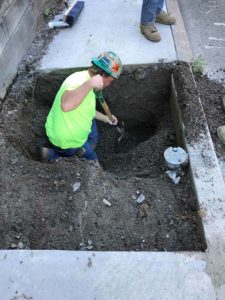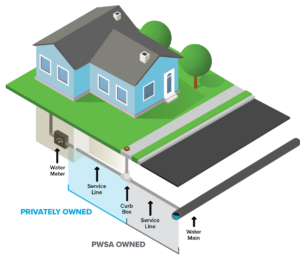PWSA Community Lead Response has replaced over 1,200 lead service lines
Pittsburgh, PA – As part of its Community Lead Response, the Pittsburgh Water and Sewer Authority (PWSA) and its contractors have replaced over 1,200 residential lead service lines. The program has reached new levels of productivity, with five contractors and over a dozen separate work crews replacing full lead lines in neighborhoods across PWSA’s drinking water service area. The program has also replaced over 300 privately-owned lead service lines, thus avoiding potentially harmful partial lead service line replacements.
The current rate of replacement places PWSA on track to meet the Pennsylvania Department of Environmental Protection (DEP) mandate to replace 1,341 public lines by June 30, 2018. The pace of replacements has increased due to favorable weather conditions, additional contractor and in-house PWSA crews, and extending working hours to evening and weekends. PWSA dedicated $44 million to replacing residential lead service lines in 2018. The Authority must replace an additional 1,341 lines from July 1 to December 30, 2018.
“Our recent progress on removing lead lines from our system is a reflection of PWSA’s steadfast commitment to protecting the public’s health. Our leadership team is tackling this program with every resource available, and we are grateful to our customers for allowing us into their homes to reduce their risk of exposure to lead in water,” said PWSA Executive Director Robert A. Weimar.

Water service lines are made up of two parts – a public side that runs from the water main to the curb, and a private side running from the curb into the home. PWSA has ownership and maintenance responsibility for the public side but replacing only a portion of a lead line can temporarily raise lead levels in homes.
Homes identified under PWSA’s 2018 replacement program can have both portions replaced at no cost to the customer. Property owners eligible for a private lead line replacement are contacted by PWSA and must provide consent and access to the home before contractors can replace their private lead line. Performing full line replacement entails multiple layers of coordination between customers and construction crews who must work in public roads and inside private property. To meet this demand, PWSA has established a 30-person cross-functional team of engineers, plumbers, customer service representatives and communications specialists dedicated to

replacing as many full lead service lines as possible.
PWSA Board Chairman Paul Leger said, “There is no higher priority for PWSA’s publicly-appointed Board of Directors than ensuring the safety of our drinking water. We will continue to provide the Authority with the resources to replace as many full lead service lines as possible, while also taking immediate action to improve our water treatment to reduce corrosion.”
PWSA received approval from DEP to add orthophosphate to treated drinking water in May. Orthophosphate is used by major water systems across the country to successfully control corrosion from lead pipes. The Authority conducted a year-long comprehensive study that determined orthophosphate will be effective in PWSA’s water system. The facilities required to add orthophosphate are under construction and will be operational in early fall.
Contractor lead line replacement work to-date has taken place in Mount Washington, Beltzhoover, Perry North, Squirrel Hill, and the Hill District. Additional neighborhoods will be added throughout the year and PWSA’s in-house crews are performing replacements across the city and Millvale. Work areas can be found at pgh2o.com/leadmap.
PWSA recommends several steps anybody can take to reduce the risk of lead in tap water:
- Test your tap water for free. Kits can be requested at pgh2o.com/leadform or by calling our Lead Help Desk at 412.255.8987.
- Search the records we have for your home at pgh2o.com/leadmap. Many of the records are from the time of original construction, but it’s useful to see if you may have a lead service line. A registered plumber can also inspect the private line entering your home.
- If you think you have a lead service line, run your tap for at least one minute before using water for cooking or drinking. You can also use water filters certified to remove lead. Coupons for filters can be found here – http://pittsburghpa.gov/safepgh2o/ZeroWater_Coupons.pdf
- Visit pgh2o.com/lead-facts or call our Lead Help Desk at 412.255.8987 to learn more about our lead line replacement programs.
- Learn about the Allegheny County Health Department’s programs to reduce lead exposure from sources other than water at achd.net/lead.
